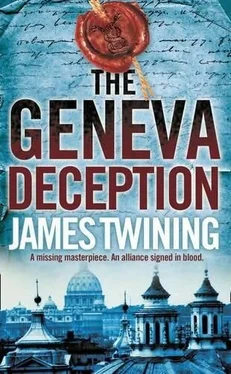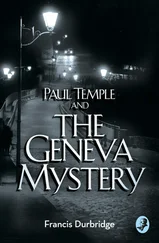Cimitero Acattolico, Rome
20th March-10.22 p.m.
‘I’ve lost her,’ Tom barked.
‘What do you mean, you’ve lost her?’ Archie grabbed the receiver from him and shook it. ‘She was just there.’
‘Well, she isn’t now,’ Tom shot back, his anger betraying his concern.
Until now, Allegra had proved surprisingly easy to track, her signal leading them from the Freeport to the cargo terminal at Geneva airport, where they had observed Faulks’s driver overseeing several large crates being loaded on to a plane bound for Rome. It hadn’t taken much imagination to deduce that she had been placed inside one of them. They had therefore immediately booked themselves on to an earlier flight to ensure that they would already be in position to pick up the signal again by the time her plane landed.
Watching through his binoculars from the airport perimeter fence, Tom had been able to tell that this was a well-established smuggling route for Faulks, the Customs officers welcoming him off the plane on to a remote part of the airfield with a broad smile as a black briefcase had swapped hands.
The cargo had then been split, some heading for the warm glow of the main terminal, the rest to a dark maintenance hangar into which Faulks had driven, the doors quickly rolling shut behind him. Then for two, maybe three hours nothing. Nothing but the steady pulse of her location transmitter on the small screen cradled in his lap. A pulse that had served as a taunting reminder of the fading beat of Jennifer’s heart-rate monitor in the helicopter over the desert. A pulse which they had carefully followed here, only to see it flatline.
Sheltered by regimented lines of mourning cypresses and Mediterranean pines, the Cimitero Acattolico nestled on the slope of the Aventine Hill, in the time-worn shadow of the Pyramid of Caius Cestius and the adjacent Aurelian walls. Even by moonlight, Tom had been able to see that it was populated by an eclectic tangle of stone monuments, graves and family vaults, separated by long grass woven with wild flowers. These elaborate constructions were in stark contrast to the trees’ dark symmetry: pale urns, broken columns, ornate scrollwork and devotional statuary bursting in pale flashes through the gaps in their evenly spaced trunks, as if deliberately planted there in an attempt to prove the superiority of human creativity over natural design.
If so, it was increasingly obvious to Tom that this was an argument that nature was winning, decades of neglect having left monuments eroded by pollution and tombs cracked open by weeds and the cruel ebb and flow of the seasons. In one place, a pine tree had shed a branch, the diseased limb collapsing on to a grave and smashing its delicately engraved headstone into pieces. In another, the ground had risen up, snapping the spine of the vault that had dared to surmount it. And now it seemed to have swallowed Allegra’s signal too.
‘Where was the last reading from?’ Dominique asked, ever practical.
‘Over there-’ Tom immediately broke into a loping run, vaulting the smaller graves and navigating his way around the larger tombs. Then, just as he was about to emerge into one of the wide avenues that cut across the cemetery, he felt Archie’s hand grab his shoulder and force him to the ground.
‘Get down,’ he hissed.
Three men had emerged from the trees ahead of them, their machine guns glinting black in the moonlight, torch beams slicing the darkness. Moving quickly, they glided over to a large family vault, their boots lost in the long grass so that they almost appeared to be floating over the ground. As Tom watched, they ghosted up its steps and vanished inside.
‘She must be in there,’ Tom guessed, standing up.
The vault was a small rectangular building designed to echo a Roman temple, a few shallow steps leading up to the entrance, a Doric frieze carved under the portico, white Travertine walls decorated with columns that gave the illusion of supporting the tiled roof. The entrance was secured by a handsome bronze door that the elements had varnished a mottled green. A single name had been carved over it: Merisi. Tom pointed at it with a smile as they crept towards it.
‘What?’ Dominique whispered.
‘Merisi was Caravaggio’s real name.’
They paused, straining to hear a voice or a sound from inside. But nothing came apart from the silent echo of darkness.
With a determined nod at the others, Tom carefully eased the door open with one hand, his gun in the other. This and three other ‘clean’ weapons had been sourced by Archie from Johnny Li while they had been watching the hangar at Rome airport. The price had been steep-the money he claimed Tom still owed him, plus another ten for his trouble. Archie had only just stopped cursing about it, although Johnny had at least held his half of their earlier bargain and returned Tom’s watch.
Inside, a thin carpet of dirt and leaves covered the black-and-white mosaic floor and lay pooled in the room’s dark corners. At the far end stood a black marble altar with the name Merisi again picked out in bronze letters above a date-1696. In front of this were two high-backed prayer stools, once painted black and upholstered in a rich velvet, but now peeling and rotted by the cold and the damp. Above the altar, suspended from the wall, was a crucifix, one arm of which had broken off so that it hung at an odd angle.
The room was empty.
‘Where the hell have they gone?’ Archie exclaimed, rapping the walls to make sure they were solid.
Tom examined the floor with a frown.
‘How did they expect to bury anyone in here?’
‘What do you mean?’ Dominique frowned.
‘It’s a family vault. There should be a slab or something that can be lifted up.’
‘No inscriptions either,’ Archie chimed in. ‘Not even a full set of dates.’
‘And the one that’s here doesn’t fit,’ Dominique pointed out. ‘This graveyard wasn’t used until the 1730s. No one would have been buried here in 1696.’
‘It could be a birth year,’ Tom suggested, crouching down in front of the altar. ‘Maybe the second date has come away and…’
The words caught in his throat. As he’d rubbed the marble, his fingers had brushed against the final number, causing it to move slightly. He glanced up at the others to check that they had seen this too, then reached forward to turn it, the number spinning clockwise and then clicking into place once it was upside down so that it now read as a nine.
Archie frowned. ‘1699? That doesn’t make no sense either?’
‘Not 1699-1969,’ Tom guessed, turning each of the previous three numbers so that they also clicked into place upside down. ‘The year the Caravaggio was stolen.’
There was the dull thud of what sounded like a restraining bolt being drawn back from somewhere in front of them. Then, with the suppressed hiss of a hydraulic ram, the massive altar began to lift up and out, pivoting high above their heads, stopping a few inches below the coffered ceiling.
They jumped back, swapping a surprised look. Ahead of them, a flight of steps disappeared into the ground.
20th March-10.37 p.m.
The steps led down to a brick-lined corridor set on a shallow incline. It was dimly lit, the sodium lighting suspended from the vaulted ceiling at irregular intervals forming pallid pools of orange light that barely penetrated the cloying darkness. In places the water had forced its way in, the ceiling flowering with calcite rings that dripped on to the glistening concrete floor.
Treading carefully, their guns aiming towards the darkness into which the three armed men who had preceded them down here had presumably disappeared, they crept down the tunnel. Tom had the vague sense that they were following the contour of the Aventine as it rose steeply to their right, although it was hard to be sure, the passage tracing a bewildering course as it zigzagged violently between the graveyard’s scattered crypts and burial chambers. Eventually, after about two hundred yards, it ended, opening up into a subterranean network of interlinking rooms supported by steel props.
Читать дальше
Конец ознакомительного отрывка
Купить книгу












